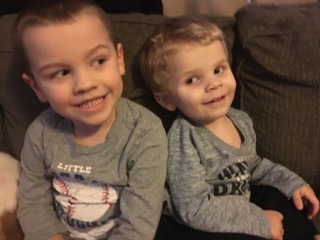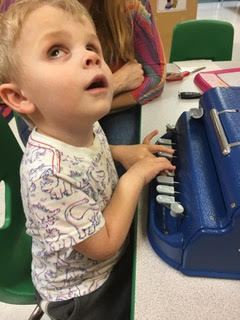Living with LCA: ‘Know It’s Not Something You’re Going to Conquer in One Day’

7-year-old Ace and his 4-year-old brother Gunner. Gunner was diagnosed at 6 months with LCA10, caused by a mutation in his CEP290 gene. Doctors determined Gunner came into this world with no usable vision cells and no light perception.
The best of both worlds – that’s how Ashlyn Lincoln describes life with her two sons: 4-year-old Gunner, who was born without vision, and 7-year-old Ace, who is sighted.
“Both Ace and Gunner teach us many life lessons, regardless of who is sighted and who is blind,” says their 29-year-old mom.
Living in eastern Iowa, Ashlyn and her husband, Axel, noticed problems with Gunner’s eyes in August 2014, when he was about 2 weeks old: he stayed awake during the day and his eyes would not focus. The pediatrician examining their infant at 6 weeks wasn’t concerned, but to put them at ease, he referred them to the first in what would become a series of specialists, leading to lots of tests on Gunner’s eyes and on his parents’ genetic backgrounds.
Gunner was diagnosed with Leber congenital amaurosis (LCA) at 4 months; at 6 months in February 2015, his parents learned through genetic testing that he had LCA10, caused by a mutation in his CEP290 gene. Doctors determined Gunner came into this world with no usable vision cells and no light perception.
Last May, the family moved to a suburb of Nashville, seeking a stronger support system and better resources for Gunner, who is now thriving at the Tennessee School for the Blind.
Mr. Independent
Gunner loves prekindergarten, especially gym time and swimming lessons. He listens to try to understand musical instruments, and he loves making art and writing on the Brailler. “He’s pretty independent,” Ashlyn says.
Ace and Gunner have a typical sibling relationship, blaming each other, kicking each other, playing in their own world, she says. “Ace pretty much treats him like he is sighted. He adjusts (when he remembers Gunner cannot see) and goes right back to thinking it. It’s the best of both worlds.
“Their positive outlook and attitudes on life really help us be better ourselves. I just feel so lucky to be able to always have different outlooks on everything that others may not realize,” she said.

Gunner ‘reads’ his Braille books. Gunner’s reading is feeling the Braille but making up his own stories as he goes along.
Their daily life is like other families — the boys get up and get ready for school, eat breakfast, brush their teeth. After school they have snack, play, watch cartoons, do homework.
“This might be the only thing ‘different,’” Ashlyn notes “Ace’s homework is reading, so Gunner will bring his Braille books to the couch and ‘read’ them, too. Gunner’s reading is feeling the Braille but making up his own stories as he goes, which are usually pretty creative and cute.”
Ashlyn’s best-of-both-worlds might as well extend to a third “world,” given the influence, support, and love she and her family have received from Axel’s “battle buddies” from his time in the Marines.
War Wounds Inside and Out
Axel served four years’ active duty (followed by four years’ inactive duty), being deployed twice to Afghanistan and once to Haiti on a relief mission.
He came home from Afghanistan suffering from severe injuries when his right shoulder took the brunt of his Humvee’s impact after it ran over an IED, an improvised explosive device.
Axel and Ashlyn married as soon as they could after his return home. He has a 90 percent disability rating for the injury and for Post-Traumatic Stress Disorder (PTSD). About two years ago, Alex’s service dog, Tucker, became part of the family, helping with his PTSD and bringing comfort when his anxiety is high. Tucker’s also great with the boys and may someday be joined by a service dog for Gunner.
Axel wasn’t the only one to come home to the Lincoln family. The Marines came, too, and they are still part of it.
When Ashlyn was about to deliver her firstborn, her husband and his Marine friends were there. If the baby was a girl, she’d get to name her. If not, Daddy and his buddies had the honors.
“They gave me options. I had Achilles, Leonidas, Thor, Zeus – I was excited about that one.”
Achilles it was, or Ace, as they call their now first-grader.
It was Ashlyn’s turn to name their second boy, but she still wanted to honor their military family.
She explained that a gunner, sitting on top of a Humvee and rotating 360 degrees to protect its occupants, would throw himself on a badly injured compatriot as “an unwritten act of brotherhood.” The gunner in Axel’s case did not have to, but if Axel’s injuries were worse, he would have.
“So, to go along with the history of Ace’s name, we picked Gunner to name him.”
When she picked the name, she didn’t think much about looking up its meaning.
“Later on, after we got the diagnosis, I randomly decided to look up the meaning to find it meant ‘Battle Strong,’ which seems very appropriate on our adventure.”
You’re Overwhelmed and It’s OK
Life wasn’t always easy though. Dealing with Gunner’s diagnosis and coping with new realities was difficult. Here is the message she would like to extend to other mothers: “I was overwhelmed, and I was tired. I want to acknowledge that I know you’re overwhelmed and it’s OK.
“Take baby steps, know your local resources, and know that it’s not just something you’re going to conquer in one day.”
For support and to learn more about the LCA community, Ashlyn and a friend she met through an LCA Facebook group, traveled to Connecticut last fall to attend Sofia Sees Hope’s LCA Family Conference, where she found a sense of community.
“It was fantastic,” she says. “There are families in other states and I’m not alone and here we are together. It’s just a moment where you can find comfort and know you’re not alone.”
Ashlyn said she does have a personal goal – one that she’s fulfilled right here.
“It’s hard to admit when your child is born and not perfect, and your husband has PTSD,” she said. “I hope that just by telling my story about LCA and veterans, that other families also can not feel so alone.”
